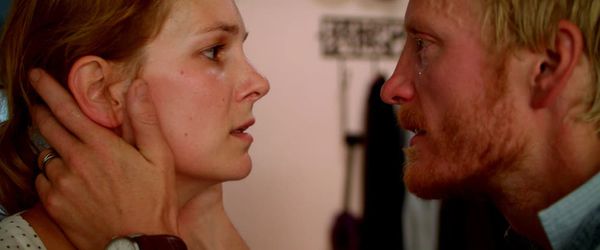Eye For Film >> Movies >> Alice (2019) Film Review
Alice
Reviewed by: Jane Fae

If you’re looking for a stylish remake of Pretty Woman, with Parisian backdrop and Gallic je-ne-sais-quoi, then Alice is not for you. Yes, it is about a young woman who takes up sex work – well, high-end escorting - in order to survive her husband’s selfishness. And it has its comic moments, its lighter moments. But overall, the subject matter is dark, dark, dark and for those concerned about such things, beware: trigger warnings for sexual violence and marital abuse. In fact, despite the inevitable focus on the sex work, and some neat one-off scenes that showcase the ultimate lostness of male clients, it would be far more accurate to describe this as a film about toxic masculinity and the ultimate hypocrisy of men when their power is challenged.
The film opens to scenes of a conventional French family: “une famille parfaite”. Mum, Alice (Emilie Piponnier) stays at home and looks after her young son Jules (Jules Milo Levy Mackerras), while husband François (Martin Swabey) goes out to bring home the bacon. Cue a series of neat establishment scenes that demonstrate to all and sundry what a good egg François is. This, though, is pretty much all prelude, dished out in the first ten minutes or so of the film.

The real departure point is the day Alice goes to the shops and discovers her credit card no longer works. In fact, none of her cards work. Her bank accounts have been looted, her inheritance squandered. Worse, no mortgage payments have been made on the home in which she lives, and the bank is on the verge of re-possessing it. And François has vanished.
After which the film falls into two distinct halves. The upward curve is about Alice starting to take responsibility – because while hubby is clearly a cad, a part of her downfall lies in her previous reliance on him. Yes, he did all this. But it would have been a great deal harder had she taken some interest in their finances, had perhaps thought to check a bank statement even once in a year.
The beginnings of this awakening lie in the discovery that the money has all been spent on high-end escorts. Her husband is both addicted and a dickhead. In another universe, someone, somewhere is even now putting together the film that tells the “other side” of Alice: a story, no doubt, of a descent into obsession, accompanied by a great deal of ironic self-justification.
But this is Alice’s tale. Having discovered where the money went, Alice realises that the most effective way to sort out her own finances are to join the game. Because €2,000 a night for her services, will quickly put a dent in the accumulated debt. This, too, is where another might have taken the film in a different direction. A light-hearted romp through the upper echelons of the Parisian sex trade. Or even “Carry on Escorting”.
In the hands of writer/director Josephine Mackerras, that is not where we are headed., though there is plenty in this first half to suggest such - a lot of focus on the peculiar sexual predilections of the assorted men with whom Alice quickly becomes intimate, if not entirely familiar. Those who consider anything and everything to do with sex work to be unmitigated evil will not like this bit.
For it is in this half that Alice starts, for the first time in her life, to feel free to be herself, in control. Here, too, she gains a real friend, sister escort, Véra (Marie-Laure Dougnac).
But – and it is a big but, which for my money belies the “comedy, drama, romance” tags attached to this film on IMDB – there is a second, downward curve, which is where the darkness rears its head. No spoilers but for reasons that seem at first reasonable, Alice allows François back into her life on a limited basis and, given an inch, he prepares to take several miles.
Did I say he was a dickhead? My mistake! He is an abusive dickhead: violent, controlling, gaslighting. At this point in the film, I was truly on the edge of my seat. “Don’t let him in!”
And, “No-o!”
All I will say is, it works out. The script is sharp, witty and not afraid to ask awkward questions. Of course, François is the villain of the piece. But it would be too easy to make this all black and white: bad man; good woman.
In the end, Alice is about a woman taking back control of her life but in order to do that, she needs first to understand the ways in which she has ceded control to others. And that – not the sex work, not the confrontation with her husband – is the true focus here.
For all that I found this film upsetting in places, it is an intelligent examination of difficult issues, aided and abetted by moments of lightness, great use of Paris scenery, and a not bad soundtrack. Though whoever added the romance tag needs seriously to rethink their definition of romance.
Reviewed on: 24 Jul 2020
















